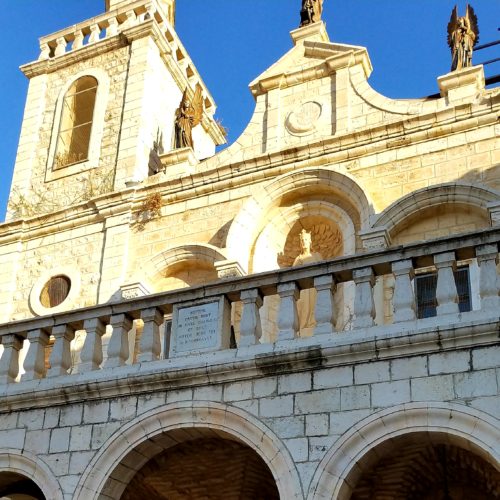Cana, Israel
It was in a wedding at Cana that Jesus performed his first miracle. When the wedding party he and Mary were attending ran out of wine, Jesus transformed six jars of water into wine. I suppose it is the wedding setting of this miracle that has inspired tourists from all over the world to get married or renew their vows in the church here. Seven couples, including my parents, renewed their vows in Cana during this pilgrimage. Fr Phil Estrella, our pilgrimage chaplain, celebrated a lovely mass for them. My thoughts below were inspired by his homily on love and marriage.
*
Language and the Human Experience
Language and the human experience are intrinsically linked.
Language is the prism through which we see the world. It is the tool by which we process and understand our experiences. Without the appropriate words, the experience cannot take root in the formation of our personal and cultural identities. Our words mold us.
The words we use also influence our response to events. In the theory of linguistic relativity, it is believed that different cultures respond differently to the same experience depending on the words available to them. Seeing a cute chubby baby, for example, may not trigger the same strange urge to pinch and bite it if the word gigil did not exist in the vocabulary.
Moreover, our language is a reflection of our shared reality. Our vocabulary reveals what we collectively find significant in our experiences. We know how integral snow is to the Eskimo culture by the number of terms they have for snow. Same goes for Filipino and rice (palay, bigas, kanin, bahaw . . .)
Love in English
The English language uses one word to describe the experience of a strong affinity for something or someone: love. We “love” everything. We love chocolate, as we love our parents, as we love our romantic partners. In English, love is monotone.
Moreover, this singular tone has been hijacked by modern romance stories. Love, we have come to learn, must be accompanied by benevolent feelings (and maybe butterflies and fireworks). Even the English dictionary defines love as “an intense feeling of deep affection” or “a profoundly tender passionate affection for someone”. In English love is monotone and binary. If it doesn’t sound like Hollywood love, then it must not be love.
Love in Ancient Greek
A study of ancient Greek offers us a look at the subtleties of a more profound experience of love. The language contains words for various types of love.
The love that we most identify with, romantic love, is called eros. It is the root for erotic. It is the mad love; the intense, passionate, physical love that takes us by surprise. We “fall” into this love. And just like falling, it cannot continue indefinitely. At some point, eros hits the ground.
Another type of love is storge. This love is most commonly associated with the love between parents and children. This love is not a passionate love. Rather, it is a love borne out of familiarity and dependency. It is the love that can cause a romance to grow out of a friendship. It is quietly and slowly molded from daily routine. Storge pulls us out of bed in the morning to make breakfast for our partner. It makes us stick around because who else will give us foot massages? It makes us miss their scent when they are gone. Storge is the love that holds memories tightly.
Another one is philia. This love is most associated with friendships. It also is not a sexually-charged kind of love. It is the love that promotes mutual growth. It makes us share new learnings with our partner; makes us want the best for them. This love compels us to be each other’s therapist and cheerleader. It makes us fully supportive of their passion projects, rejoice in their successes, and aggressively confront their enemies for them (behind their backs) (risking the ire of said partner) (but anyway. . .).
Then, there’s the love of pragma. This is the love that sees us through the rough times — when eros is long gone, and storge and philia are on an extended vacation. It is a practical, rational love founded on duty. Pragma holds us together by repeatedly calling forth the commitment we made to each other. It is a steadfast love that elicits compromise, patience and sacrifice, when all we really want to do is “send them back to their mothers” (Fr. Phil).
Consolations of an Expanded Language
The expanded language of love of the ancient Greeks offers us a more compassionate prism through which we can understand our own experience. By better reflecting the nuanced tones of love – the melodies as well as all its cacophony – it acknowledges all our various idiosyncratic experiences of love. The strange and complex attachment we have for our partner, while it may not look or feel like the English notion of romantic love, has a home in this language and may still actually be “love”. Simply knowing this might help us more finely process our experience and respond accordingly.
An expanded language also consoles us that this strange attachment we have is a shared reality; that our individual love stories, no matter how peculiar, are universal and have been lived by others through the centuries.
And finally, returning to the wedding and the homily in Cana, an expanded language of love reminds us of the miracle of transformations. Fr. Phil emphasized, “only when the honeymoon ends can real love begin.” The end of eros is not necessarily the end of love. Rather, it is a doorway to a transformation towards love that more enduring and ever more fulfilling.
#observationsonitchyfeet
I would love to know what you think. Please leave your comments in the space below.

